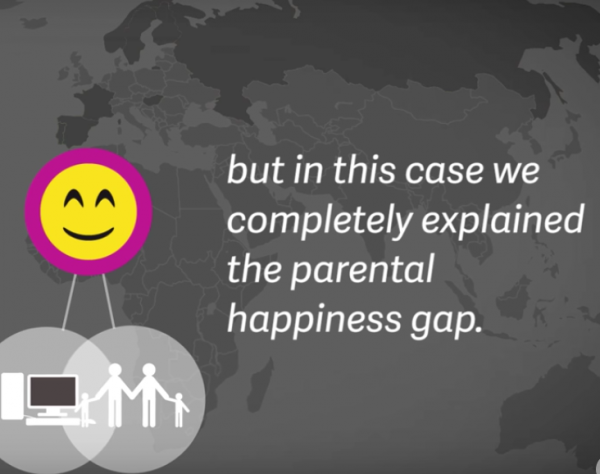
A briefing paper prepared for the Council on Contemporary Families by Jennifer Glass, University of Texas; Robin Simon, Wake Forest University; and Matthew Andersson, Baylor University
June 16, 2016
Many people now know that parents in the United States report being less happy than nonparents, but there is considerable disagreement about why parents pay a “happiness penalty,” along with conflicting reports about whether this is true in most contemporary cultures. To explore these questions, our team, with support from the National Science Foundation, examined comparative data from 22 European and English-speaking countries. We utilized two well-respected surveys (the International Social Surveys of 2007 and 2008 and the European Social Surveys of 2006 and 2008), confining ourselves to data prior to the global recession in order to avoid confusing reports of happiness in a period of relative prosperity with reports taken in a period of economic stress.
The good news is that parents are not doomed to be unhappier than non-parents. Our results indicate that the parental “happiness penalty” varies substantially from country to country, and is not an inevitable accompaniment of contemporary family life. In fact, in some countries, such as Norway and Hungary, parents are actually happier than non-parents!
The bad news is that of the 22 countries we studied, the U.S. has the largest happiness shortfall among parents compared to nonparents, significantly larger than the gap found in Great Britain and Australia.
But why are parents so much less happy than the childfree in the U.S., when other countries show different patterns? This is a somewhat complicated question to answer because of cultural differences in people’s definitions, standards, and self-reports of happiness. People in the U.S. tend to say they are pretty happy overall: On a scale from 1-10, Americans hover in the 8-10 range. People in France tend to rate their levels significantly lower – in the middle of the scale from 5-7. We aren’t sure if this means the French are truly less happy than Americans, or just don’t think it is appropriate to use the extremes of any scale.Accordingly, we focused on the differences between parents and nonparents in the same country, or the relative effects of parenting. What factors are associated with parents being less happy than nonparents, given their country’s overall average level of happiness? Is it levels of unplanned parenthood or perhaps larger overall family sizes that depress parental happiness? Perhaps countries with more unexpected births and larger families end up with more parents who are unhappy and stressed-out. We checked out this hypothesis, but our data revealed that these factors were relatively unimportant in understanding why parents are less happy than childfree individuals in many countries.
So maybe parental happiness gaps are related to the differing costs — in time, money, and energy — of raising children in the countries we studied. We looked at several specific government policies that we thought would make a difference in the lives of employed parents – the duration and generosity of paid parenting leave, the number of annual paid sick and vacation days guaranteed by law, the cost of child care for the average two-year old as a percent of median wages, and the extent of work schedule flexibility offered to parents of dependent children. We also constructed a summary policy measure, combining all these, to differentiate countries with good parental policy “packages” from countries with weak parental policy “packages.” We gathered this policy information for all 22 of our countries, along with their Gross Domestic Product and their fertility rate, to make sure that our findings were not simply reflecting the effects of living in a richer country versus a poorer one.
What we found was astonishing. The negative effects of parenthood on happiness were entirely explained by the presence or absence of social policies allowing parents to better combine paid work with family obligations. And this was true for both mothers and fathers. Countries with better family policy “packages” had no happiness gap between parents and nonparents.Furthermore, the positive effects of good family support policies for parents were not achieved at the expense of nonparents, as some commentators have claimed might be the case. The policies that helped parents the most were policies that also improved the happiness of everyone in that country, whether they had children or not. Policies such as guaranteed minimum paid sick and vacation days make everyone happier, but they had an extra happiness bonus for parents of minor children.
The same pattern held even for policies such as subsidized child care, which one might assume would only benefit parents. Countries with cheaper out-of-pocket costs for child care had happier nonparents as well as parents.
Another striking finding was that giving money to parents in the form of child allowances or monthly payments had less effect on parental happiness than giving them the tools to combine employment with parenting. Many European countries have child allowances in varying amounts, but few of these policies had a significant impact on the relative happiness of mothers or fathers compared to nonparents.There were a few differences in what increased the happiness of fathers compared to mothers. Fathers’ happiness was slightly more sensitive to money policies (child care costs, specifically), and mothers’ happiness was slightly more sensitive to time policies (especially paid sick and vacation days). But these differences were minor. The most important predictor of higher relative levels of happiness for parents was the presence of family policies making it less stressful and less costly combine childrearing with paid work. And such policies seemed to increase the happiness level of childless individuals as well.

Comments